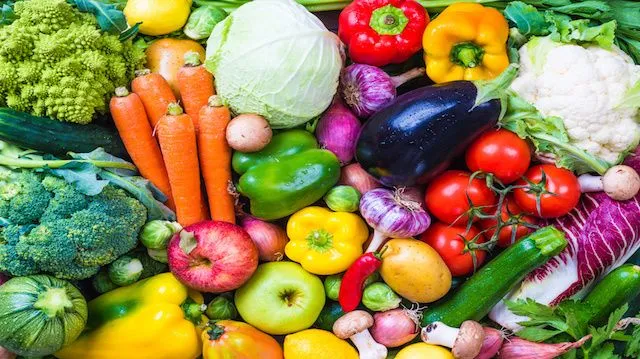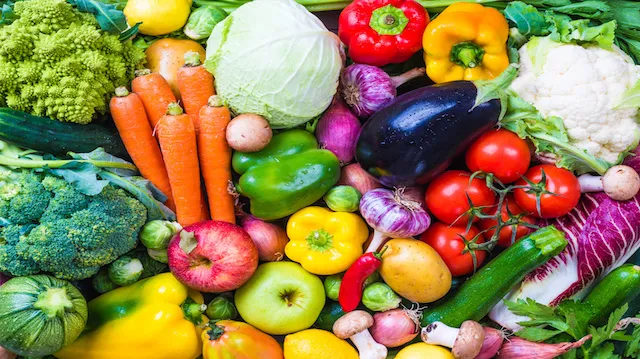
- Share on Facebook14
- Share on Pinterest
- Share on Twitter
Most Americans do not eat enough vegetables. According to the Centers for Disease Control and Prevention (CDC), 22 percent of American adults eat vegetables less than once a day, and the average person only eats vegetables 1.6 times a day. The U.S. Department of Agriculture (USDA) dietary guidelines for 2015 recommend that the average adult should eat between two and three cups of vegetables daily. Many Americans eat far less than one cup of vegetables daily.
Vegetarianism is seen as a simple solution to the problem. By removing meat from your diet, you will probably eat a lot more vegetables and fruit, ensuring that you get enough each day. But did you also know there are nutrients that are impossible to get by eating vegetables alone? Many of the most vital nutrients for the human body are only found in animal sources.
Luckily, your body can make its own version of many of these nutrients using vegetables, but vegetarians will have to work extra hard to ensure they do not face serious nutrient deficiencies. Vegetarians may have to supplement to obtain optimal levels of these vital nutrients.
If you’re a vegetarian, make sure you’re getting enough of the following nutrients:
Vitamin B12
A 2013 report published in Nutrition Reviews found that many vegetarians are lacking in vitamin B12. Vitamin B12 is necessary for brain health, cell health, and blood health. However, vitamin B12 is almost exclusively found in animal products.
Foods rich in vitamin B12
- Fish
- Seafood
- Dairy
- Eggs
Vegetarians can find B12 in seaweed but usually require supplements to keep vitamin B12 at optimal levels.
Vitamin D3
Vitamin D3 is the sunshine vitamin. It is surprising that vegetarians are often low in this vitamin since the best source of vitamin D3 is sunlight. If you are exposed to a large amount of sunlight daily, your vitamin D3 levels should remain at optimal levels.
However, with the modern lifestyle of indoor living, much of our vitamin D comes from food, and animal products are the foods with the largest quantity of vitamin D3. Plants carry vitamin D2, which is also necessary, but cannot completely replace vitamin D3. Vitamin D is used to fight osteoporosis, heart disease, depression, brain diseases and muscle weakness.
Foods rich in vitamin D3
- Fatty fish
- Egg yolks
- Cod liver oil
Vegetarians should absorb sunshine as much as possible and look into taking a vitamin D3 supplement to prevent bone and muscle loss.
Taurine
Taurine is a nutrient that we don’t often hear about. Taurine is a sulfur compound used in the brain, kidneys and heart. Taurine helps with muscle function, antioxidant function and bile salt formation. Taurine is only found in animal products, and vegetarians are often significantly lower in taurine than meat eaters.
Foods rich in taurine
- Fish
- Seafood
- Poultry
- Dairy
- Meat
There is no suitable taurine replacement in the plant world, so vegetarians should either add eggs to their diet or take taurine supplements to keep taurine at optimal levels.
Creatine
Creatine is used to form energy in muscles and cells, and is responsible for greater muscle strength and endurance. Many bodybuilders take creatine supplements to encourage muscle growth. Studies show that vegetarians are often lacking in creatine as it is found only in animal products.
Foods rich in creatine
- Meat
- Eggs
- Fish
- Dairy
The body produces some creatine on its own, but supplementing with creatine will help vegetarians maintain optimal levels.
Carnosine
Antioxidants are thought to mainly come from plant sources, but carnosine is an antioxidant only found in animal foods. Carnosine is linked with reducing muscle fatigue and improving muscle performance.
Foods rich in carnosine
- Eggs
- Dairy
- Meat
- Poultry
- Fish
 Vegetarians do produce some level of carnosine internally, but studies show that vegetarians have lower levels of carnosine overall. Supplementing with carnosine will help prevent muscle fatigue and improve muscle health.
Vegetarians do produce some level of carnosine internally, but studies show that vegetarians have lower levels of carnosine overall. Supplementing with carnosine will help prevent muscle fatigue and improve muscle health.
Docosahexaenoic acid (DHA)
DHA is a form of omega-3 fatty acid that is essential for brain development. DHA is only found in animal products. DHA deficiency can lead to problems in mental health and cognitive function.
Foods rich in DHA
- Fish
- Fish oil
- Microalgae
- Grassfed dairy
The body can convert some vegetable-based omega-3 fats into DHA, but it is more efficient to eat DHA directly from the source. Vegetarians may want to consider taking DHA supplements to prevent a lack of DHA.
There are some great health benefits to following a vegetarian or vegan diet, and you will likely benefit from much higher levels of plant nutrients. However, there are a few nutrients that are challenging to get without consuming animal products. Vegetarians are often low in these nutrients, so supplements are a viable replacement for animal products for vegetarians committed to the lifestyle.
—The Alternative Daily
Sources:
http://www.cdc.gov/nutrition/downloads/State-Indicator-Report-Fruits-Vegetables-2013.pdf
http://www.ncbi.nlm.nih.gov/pubmed/23356638
http://ajcn.nutrition.org/content/47/4/660.short
http://pen.sagepub.com/content/14/2/183.short
http://www.ncbi.nlm.nih.gov/pubmed/14600563
http://www.ncbi.nlm.nih.gov/pubmed/17136505
http://www.ncbi.nlm.nih.gov/pubmed/20478353
- Share on Facebook14
- Share on Pinterest
- Share on Twitter

